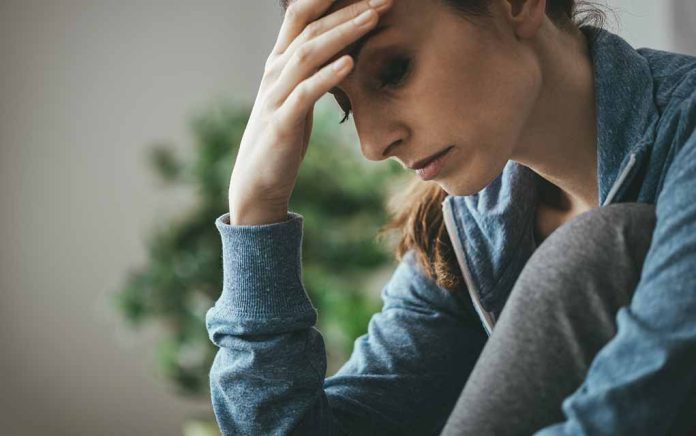
(HealthyResearch.com)- According to the Anxiety and Depression Association of America, more than 40 million adults over the age of 18 struggle with some sort of anxiety disorder — generalized anxiety, panic disorders, social anxiety, phobias, and others. Despite the relative ease and availability of treatment, just under 37 percent of those with anxiety seek help, leaving more than 63 percent struggling. But why? Could cannabidiol (CBD) be the solution?
Could CBD Help with Anxiety?
While there isn’t a lot of formal research into the effects of CBD on anxiety, anecdotal evidence paints a pretty interesting picture. A study published in Cannabis and Cannabinoid Research took a look at a cross-section of CBD oil users. Of the 2,409 people surveyed, “Almost 62% of CBD users reported using CBD to treat a medical condition. The top three medical conditions users reported treating were pain, anxiety and depression.
While the say-so of a random sampling of adults isn’t necessarily scientific evidence, researchers have been looking into how CBD may help with anxiety. As of right now, they seem to believe the compound helps the body produce serotonin in a manner similar to SSRI drugs, which targets the 5-HT1A receptor. The easier it is for your body to access serotonin, the better your mood becomes.
A study released by the journal Lippincott Williams and Wilkins, a division of Wolters Kluwer Health Information took a look at how CBD impacted the same 5-HT1A receptors in rats. They found the rats exhibited reduced “anxiety-like” behaviors. This finding has yet to be formally tested on humans.
Anxiety and Our Health
Why does it even matter? The unfortunate reality is that uncontrolled stress wears on us over time, causing us to become both physically and mentally ill. Our bodies have a subconscious ability to recognize stress (and anxiety and fear are stressors), even when we don’t acknowledge what we’re feeling.
The physical body reacts to anxiety by sending signals like headaches, muscle tension, sleep disturbances and therefore fatigue. Our moods begin to change as well. We find ourselves overwhelmed, irritable, unmotivated, angry, sad and even depressed. If left unchecked, we may even end up modifying our behavior patterns to cope; ultimately withdrawing from our family and friends, eating poorly, becoming sedentary and in some cases turning to alcohol or drugs for relief.
From a mental health perspective, untreated anxiety can lead to more serious forms of depression or panic disorders, both of which can become debilitating. Chronic stress and anxiety can impact our physical health by decreasing the immune system’s ability to function. Those who are constantly stressed or anxious are more likely to succumb to the flu, colds and other infections. They may even develop chronic conditions like irritable bowel syndrome (IBS).
How CBD Interacts with the Body
CBD occurs naturally in both marijuana and hemp plants. CBD products derived from hemp are legal in all 50 states because they do not contain THC, the property in marijuana that gives it psychoactive effects.
The two main receptors in the body that react to the CBD compound are cannabinoid 1 and cannabinoid 2, or CB1 and CB2. Our CB1 receptors are responsible for our coordination skills while our CB2 receptors tie into our nervous system. CBD binds to CB2 receptors very well, creating a calming sensation and even relief from pain.
Existing Treatments for Anxiety
Common treatments for anxiety include counseling, anti-anxiety medications, antidepressants or a combination of therapies. Long-term drugs used to treat anxiety include selective serotonin reuptake inhibitors (SSRIs) like Lexapro, Prozac, Paxil or Zoloft. Tricyclic drugs (Anafranil, Tofranil), MAOIs (Marplan, Nardil, Emsam, Parnate) and beta-blockers can also be used to treat anxiety symptoms.
The downside to these treatments is they can take up to six weeks to start working and may cause significant side effects. SSRIs can cause drowsiness, dry mouth, muscle weakness, diarrhea, dizziness and nausea. Tricyclics may cause similar symptoms, but are also known to cause weight gain, vision problems and constipation. MAOIs can’t be combined with SSRIs, certain common over-the-counter pain relievers and allergy medications, and can’t be combined with certain foods.
But what about mindfulness and lifestyle changes? While some people find success through commonly recommended alternatives to medication, many find that having a great routine, keeping to a sleep schedule, exercising and activities like yoga or meditation just aren’t enough. This is especially true if a person’s anxiety is caused by a chemical imbalance in the brain.
That said, it can be frustrating to try to treat anxiety with drugs that cause physical side effects and contribute to the vicious cycle of illness, worry, and more stress. This why so many people are taking such a close look at the use of cannabidiol (CBD) to treat anxiety.
Summing Up Our Research
While hemp-derived products are largely believed to be safe, there are some things you should keep in mind if you are considering trying CBD to treat your anxiety:
- The FDA is currently in the process of considering CBD, it has not yet approved any drugs with CBD ingredients and does not approve of any medical claims.
- Talk to your doctor before starting the use of CBD to make sure it will not react with any other prescription medications you are taking. This is especially important for those taking anti-seizure medications or blood thinners.
- There is currently no regulation of the quality of CBD products. Make sure you look for companies that offer information about where they source their hemp and whether or not it was grown with pesticides. Transparent companies will publish the results of third-party lab testing done on their products.
- There are no formal dosing guidelines for CBD products. Most who use CBD start small and adjust their doses until they achieve the results they are looking for.
That brings us back to the question about whether or not CBD oil can offer relief to those struggling with anxiety. There’s a lot of promise when it comes to the use of CBD for anxiety, but it’s important to remember there is not yet any formal research into this particular use — at least none done on humans. It will be up to you and your doctor to decide if the pros of giving it a try outweigh any other health risks or concerns.
Copyright 2021, HealthyResearch.com
















